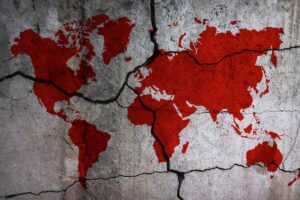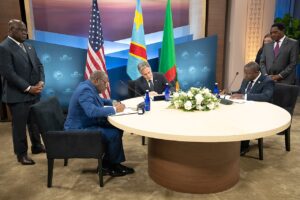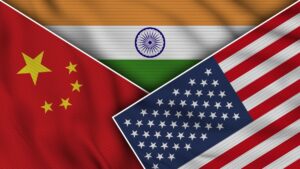Aude Darnal, Research Analyst and Manager of the Global South in the World Order Project at the Stimson Center and Damien Cristofari, Senior Counselor and Head of the Political Section at the Embassy of France in the United States.
The Global South, A Concept Supporting Strategic Empathy?
Over the past two years, there has been a slow shift in how Western policymakers address Southern perspectives on international affairs. Russia’s invasion of Ukraine especially has spurred Western powers, including France, to reassess their view on the importance of Global South states in the world order, as they failed to secure wide diplomatic support during several United Nations resolution votes and the application of sanctions against Russia. As a result, Western policymakers are gradually reckoning with what the Global South has known for decades: global governance is imbalanced, marginalizes emerging countries, and is one of the major impediments to the latter’s economic and human development.
This shift in perceptions was noticeable in the discussions we heard at the French Embassy. The Global South in the World Order Project’s reception brought together a diverse group of people — including diplomats, representatives from think tanks, the International Monetary Fund (IMF), the World Bank, and academia. They discussed their expectations from the Spring Meetings and reflected on France’s efforts to partner with strategic Southern nations, such as Barbados, to help foster the reform of the international financial architecture.
However, as one of the Embassy’s representatives emphasized, in Western diplomat ranks, the concept of the “Global South” remains a topic of debate and contention. There were therefore some passionate discussions about the concept and the misunderstandings that continue to dominate Western policy circles. We heard, for instance, our Argentinian peers arguing in favor of the concept, seen as an element for rallying diverse sets of countries around shared struggles and identities. That said, the discussions fortunately did not solely focus on semantics, which derail attention from the issues at stake and foster never-ending semantic debates.


From the 2023 Paris Summit…
Nonetheless, there was a certain consensus on the fact that the current international financial architecture must evolve, even though the way forward remains to be defined. In that context, French diplomats expressed their country’s commitment to being an ally of the South in fostering that transformation. They shared details about the 2023 Paris Summit for a New Global Financing Pact and its subsequent Paris Pact for People and the Planet (4P), which notably affirms that “no country should have to choose between fighting poverty and saving the planet.” The 4P calls for more financing for Global South countries in need of it, solutions to address their debt burden, and more engagement by the private sector.
But there was also a big elephant in the room. As summits and declarations multiply, several major questions remain: how far is France ready to go with the institutional reforms called for by the South, and how to translate shared principles into actionable policies that consider the diverse challenges faced by the countries in most need of international financing — and their often-contradicting interests at both national and regional levels.

… to the 2024 Spring Meetings
The reception’s attendees are of course awaiting the Spring Meetings, taking place this week, with excitement, though they are also cleared-eyed on the fact that it will take much more for the overhaul to happen. The willingness displayed by some Western countries such as France to support significant reform at the IMF and the World Bank shows that a wider segment of Western policymakers knows that business as usual cannot continue. On that note, it will be interesting to see if France is ready and committed to facing its ally, the United States, which on many reform topics supports the status quo.





